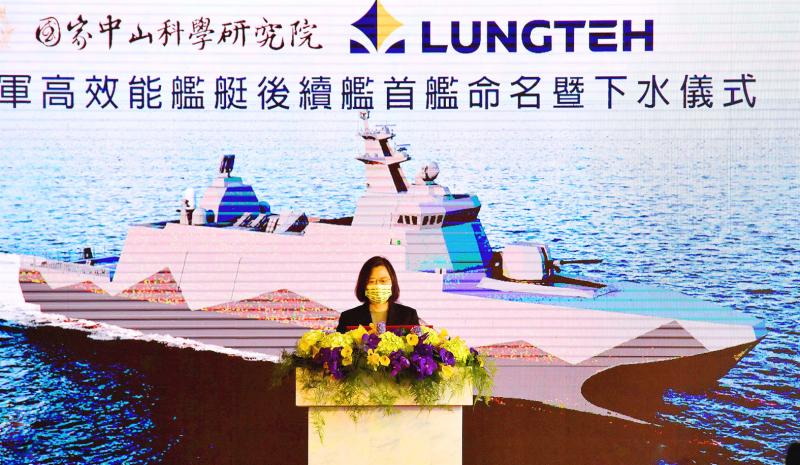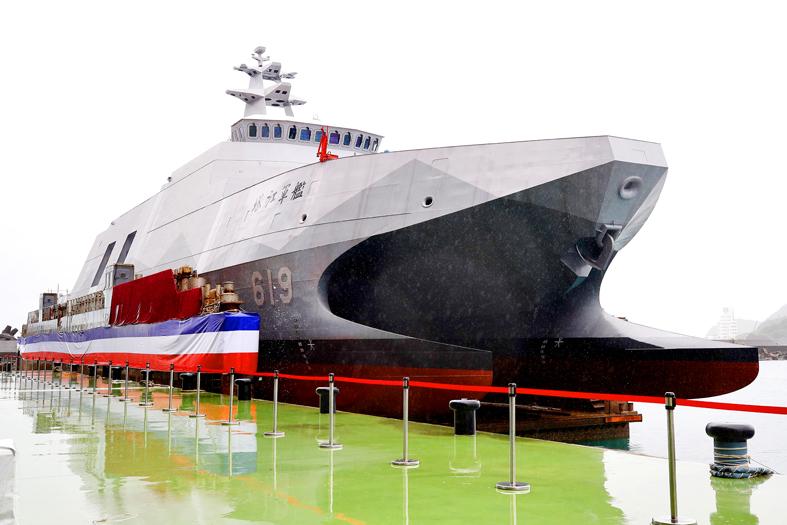Taiwan might become a supplier of weapons to Western democracies, President Tsai Ing-wen (蔡英文) said yesterday, praising the nation’s improving weapons design ability as she launched an advanced, missile-laden warship and commissioned a new minelayer.
Tsai has made boosting the defense of the nation a priority in the face of a growing military challenge from Beijing, which has never renounced the use of force to bring Taiwan under its control.
While the nation’s air force has benefited from big-ticket imported items such as new and upgraded F-16s, the navy is Tsai’s next focus, with submarines in production and the first of a fleet of highly maneuverable stealth corvettes launched yesterday.

Photo: CNA
The new Tuo Chiang-class corvettes, a prototype of which is already in operation, have been dubbed “aircraft carrier killers” by the navy, due to their complement of anti-ship missiles. They can also carry Sky Sword anti-aircraft missiles.
In a speech at Lung Teh Shipbuilding Co’s (龍德造船) shipyard in Yilan County’s Suao Township (蘇澳), Tsai said Taiwan is beginning to see the results of her administration’s policy of pursuing self-sufficiency in national defense capability.
A long series of developments, including the start of construction on a domestic submarine and the handover of new patrol ships and minelayers, show that indigenous defense manufacturing is making “thorough and comprehensive” progress, Tsai said.

Photo: Ritchie B. Tongo, EPA-EFE
During her speech marking the launch of the Ta Chiang (塔江艦) — the first mass-produced Tuo Chiang-class ship — Tsai said the vessel, as well as a new minelayer developed for the navy, would deter attacks and showcase Taiwan’s research and development ability.
“We have the determination and capability to complete the task of building our own ships, letting the world see our defense research and development energy,” Tsai said.
The Ta Chiang’s name contains a reference to the Tawa River (塔瓦溪) in Taitung County, which forms the ancestral hunting grounds of the Paiwan people, while also alluding to the vessel’s symbolic role as a “tower” (塔) on the front line of the nation’s defense, the navy said.
The minelayer has a maximum speed of 14 knots (26kph) and a displacement of 347 tonnes.
It is equipped with a T-75 20mm cannon and T-74 machine guns, as well as a domestically developed minelaying system, the navy said.
“In the future, we might also become a supply source of related equipment and components in Western democracies, driving the upgrading of the defense industry,” Tsai said.
The US is Taiwan’s main foreign source of weapons. Most countries shy away from arming Taiwan, wary of angering Beijing and losing valuable commercial contracts with the world’s second-largest economy.
Tsai, re-elected by a landslide in January on a vow to stand up to China, has championed the concept of “asymmetric warfare,” focusing on high-tech, mobile weapons designed to make any Chinese attack as difficult as possible.
She has bolstered the domestic arms industry to try to make Taiwan as self-sufficient as possible.

TRUST: The KMT said it respected the US’ timing and considerations, and hoped it would continue to honor its commitments to helping Taiwan bolster its defenses and deterrence US President Donald Trump is delaying a multibillion-dollar arms sale to Taiwan to ensure his visit to Beijing is successful, a New York Times report said. The weapons sales package has stalled in the US Department of State, the report said, citing US officials it did not identify. The White House has told agencies not to push forward ahead of Trump’s meeting with Chinese President Xi Jinping (習近平), it said. The two last month held a phone call to discuss trade and geopolitical flashpoints ahead of the summit. Xi raised the Taiwan issue and urged the US to handle arms sales to

A magnitude 5.6 earthquake struck off the coast of Yilan County at 12:37pm today, with clear shaking felt across much of northern Taiwan. There were no immediate reports of damage. The epicenter of the quake was 16.9km east-southeast of Yilan County Hall offshore at a depth of 66.8km, Central Weather Administration (CWA) data showed. The maximum intensity registered at a 4 in Yilan County’s Nanao Township (南澳) on Taiwan’s seven-tier scale. Other parts of Yilan, as well as certain areas of Hualien County, Taipei, New Taipei City, Taoyuan, Hsinchu County, Taichung and Miaoli County, recorded intensities of 3. Residents of Yilan County and Taipei received

Taiwan has secured another breakthrough in fruit exports, with jujubes, dragon fruit and lychees approved for shipment to the EU, the Ministry of Agriculture said yesterday. The Animal and Plant Health Inspection Agency on Thursday received formal notification of the approval from the EU, the ministry said, adding that the decision was expected to expand Taiwanese fruit producers’ access to high-end European markets. Taiwan exported 126 tonnes of lychees last year, valued at US$1.48 million, with Japan accounting for 102 tonnes. Other export destinations included New Zealand, Hong Kong, the US and Australia, ministry data showed. Jujube exports totaled 103 tonnes, valued at

BIG SPENDERS: Foreign investors bought the most Taiwan equities since 2005, signaling confidence that an AI boom would continue to benefit chipmakers Taiwan Semiconductor Manufacturing Co’s (TSMC, 台積電) market capitalization swelled to US$2 trillion for the first time following a 4.25 percent rally in its American depositary receipts (ADR) overnight, putting the world’s biggest contract chipmaker sixth on the list of the world’s biggest companies by market capitalization, just behind Amazon.com Inc. The site CompaniesMarketcap.com ranked TSMC ahead of Saudi Aramco and Meta Platforms Inc. The Taiwanese company’s ADRs on Tuesday surged to US$385.75 on the New York Stock Exchange, as strong demand for artificial intelligence (AI) applications led to chip supply constraints and boost revenue growth to record-breaking levels. Each TSMC ADR represents